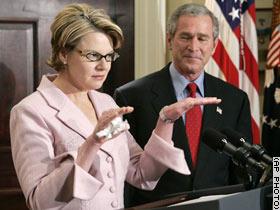Once With Heads Held High
Published 21 years, 2 months pastPerhaps unsurprisingly, I got some feedback on “Behind The Beauty, Cracks Appear“, published four weeks ago today. What did surprise me was that the feedback was for the most part supportive. In all honesty, I expected a good deal more negative feedback. After all, roughly two-thirds of my fellow state residents, and clear majorities in ten other states, voted a position opposite mine. So thanks to those of you who wrote or pinged in support.
As I say, though, there were some rebuttals to my post. As many of these rebuttals involved counterarguments of one kind or another, I thought I’d share my reactions to the arguments made in opposition to homosexual marriage. I’ll probably let this be my last word on the subject for a while.
- Majority rule
-
“It’s what the people want.”
Agreed. Thus my angst. But anyone with any sense of history knows how weak the “majority rule” argument really is. There are plenty of unacceptable things that the people wanted at one time or another: slavery, racial separation, and a restriction of voting rights to men, to name but three. (There are dozens more.)
You’ll note that I have not, at any point, advocated the overturning of the recent votes. However misguided I believe them to be, the results of these democratic votes are not something I would simply cast aside in an attempt to make the world conform to my personal views, any more than I would advocate overturning, by either legislative action or executive fiat, a Supreme Court decision on the grounds I didn’t like the ruling.
Nevertheless, I can (and some would say should) oppose this turn of events by speaking out and seeking to change minds.
- A slippery slope to Hell
-
“Once we allow gays to marry, it will open the door to bestiality, pedophilia, necrophilia, and worse.”
This is so wrong, I can’t even believe I have to explain why.
A marriage of two homosexuals would be a union between consenting adults. Got that? Everything clear? Bestiality does not involve consenting adults: it involves a human and an animal, the latter of which cannot give consent. Pedophilia does not involve consenting adults: it involves an adult and a child, the latter of which cannot be said to give informed consent, no matter what the child actually says. Necrophilia involves an adult and a corpse, the latter of which can only give consent in horror movies.
You do see the difference, right?
One person who trackbacked the original posting said, among several other equally logical things:
I’ve watched a few demolition derbies at the county fair. That looks like it would be fun to do and would make me happy. Does that mean I should be allowed to drive around on the streets and smash into cars?
Actually, it means you should be free to enter a demolition derby… which you are, assuming you have the entry fee, a car you’re willing to smash up, you agree to the rules of the event, and so on. Nobody’s outright prohibiting you or anyone else from participating. That is, after all, one of the underlying features of demolition derbies: everyone participating is a consenting adult who has entered into the activity of their own free will and with an understanding of what the activity entails.
If, on the other hand, there are demolition derbies where you are barred from participating on the basis of, say, your eye color—something which in no way adversely affects your ability to participate in the derby—then I’d say you were being unfairly discriminated against. You’d probably agree. So why disagree with me when I say it’s discriminatory to prohibit people of certain sexual orientations to marry? I don’t see a difference.
As for the “on the streets” idea (which was a fairly obvious misdirection, but I’m willing to work with it anyway) if you can get the consent of all involved parties—including all other drivers, pedestrians, property owners, and civic officials in the area you intend to do this—then yes, you should be allowed to do that. If not, then no.
I’m still sort of stunned that I have to explain that.
- A slippery slope to Hell, part 2
-
“What about polygamy? What will prevent that door from opening?”
In a word: money. Our institutions aren’t fiscally configured to deal with multi-partner marriages. Health insurance, for example, has single and family coverage, but that family coverage is structured around the idea of one spouse and some number of children (and usually the premium goes up a bit with each new child). Similarly, a university might allow a spouse to take free classes, but only one spouse. There’s no provision extending free tuition to six spouses, nor should there be: that would be an undue financial burden. Also, the IRS isn’t very likely to approve of “married filing jointly with five other returns”. And if the tax man don’t like it, well, it ain’t too likely to fly.
Besides, didn’t most of the Old Testament patriarchs have multiple wives? When you think about that just a little, it’s clear Biblical proof that marriage has not always been a bond between a single man and a single woman, and thus it seems to me that the God of the Bible didn’t intend marriage to be only the union of one man and one woman—unless the Bible is inaccurate or not to be obeyed in its entirety, of course. In which case I’d expect the really traditional churches would be pushing for polygamy, not against it.
- Cheapening of marriage
-
“If gays can get married, that will weaken traditional marriages.”
The case for allowing gays to marry begins with equality, pure and simple. Why should one set of loving, consenting adults be denied a right that other such adults have and which, if exercised, will do no damage to anyone else?
— “The case for gay marriage“, The Economist, 26 February 2004
I’d read the above-quoted article a while ago but forgotten it; Warren Stevens was kind enough to remind me about it via e-mail. It’s short, well-reasoned, and probably a better case than I could make. So is their first article on the subject, “Let them wed“, from 4 January 1996. Still, I’ll continue to add a few cents to the pot.
A heterosexual Satanist couple (but not a homosexual Christian couple) can get married anywhere in this country, and odds are that some have. Some people get married solely for financial reasons, and are essentially roommates while they date (and have sex with) other partners. Do these marriages weaken your marriage, or the marriages of those around you? Do you imagine that your marriage somehow affects theirs, making it weaker or stronger?
For that matter, if we’re going to talk about things that weaken marriage, I think we should look at the ease with which people get married and divorced in this country. That’s a far bigger threat to the sanctity of marriage than any number of gay marriages could ever be. Britney Spears got married for 55 hours. Apparently that’s more acceptable than a homosexual marriage because she was married to a man, even if for just over two days. Why would it be less acceptable if she were to marry a woman, and stay faithfully committed to that partner for the rest of her life?
If gays are able to marry, it will not bring all heterosexual marriages to a screeching halt. It won’t even make them less acceptable, or less worthy of respect. If anything, it will make them more so, because there will be a reduced demand for sham marriages.
If nothing else, I’m tired of hearing about the sanctity of marriage from nationally recognized conservatives, most of whom have already been divorced two or more times. Their hypocrisy depresses me, but their inability to defend their own marriages has, so far as I know, failed to weaken my marriage, or that of anyone I know.
- Marriage isn’t as important as love
-
“A gay couple can stay committed and faithful to one another, just as if they were married, so there’s no need to grant legal recognition.”
The freedom to marry has long been recognized as one of the vital personal rights essential to the orderly pursuit of happiness by free men.
—from the opinion of the U.S Supreme Court in 388 U.S. 1, Loving v. Virginia, 1967
I entirely agree with the Court. And no, I don’t see an ethical difference between prohibitions of marriage based on gender and those based on race, which is what 388 U.S. 1 addressed.
Furthermore, I propose that anyone who believes that marriage isn’t necessary for any truly loving homosexual couple should voluntarily abstain from marriage, and get divorced if they are already married but stay with the same partner. Show that you mean what you say. If you truly love someone, then it shouldn’t be a problem to live with them for the rest of your lives without getting officially married, just as you advocate for gays.
If that isn’t acceptable to you, and you think hard about why, then maybe you’ll begin to understand why it isn’t acceptable to gays either.
(Thanks to Rich Manalang for the pointer to 388 U.S. 1.)
- Inability to reproduce
-
“Gays don’t need to get married because they can’t have children.”
If the ability to reproduce is a core tenet of an acceptable marriage, then my marriage to Kat is unacceptable: we are unable to reproduce, and believe me, we did try. Does anyone believe that we should be forcibly divorced, or have our marriage annulled, because of this? Come on, speak up. Alternatively, should all couples who intend to get married be required to undergo fertility testing, with those who fail the testing prohibited from being married? Do you really want the government to start medically testing its citizens in order to tell them what they can or can’t do?
Because of the medical barriers to our reproducing, Kat and I chose to adopt. I know Alan Keyes condemns people like us because, in his world, adoption makes incest inevitable. (No, I’m not kidding.) Lunatics aside, though, the last time I checked adoption was seen as an acceptable course of action by most people. Regardless of how anyone feels, it is quite likely the only way Kat and I could have a family. It is also one way that a homosexual couple could have a family. I do not see a difference between the two.
Of course, gay couples are already adopting. There was one such couple in our orientation group at the adoption agency with whom we worked. Thus, homosexual marriage would change this very little, if at all. It might in some cases make it easier for a gay couple to adopt, since they could legally show combined income, joint tax returns, health insurance, and the like. I understand that would be objectionable to some, who fear that children raised by a gay couple might grow up to think of a homosexual lifestyle as acceptable. As I pointed out, too late: it’s already happening. It’s also the case that liberals are allowed to adopt—Kat and I did, after all—and many of those children grow up thinking liberalism is acceptable. Shocking, I know; and yet I assure you that it happens.
Anyone in favor of restricting adoption only to those people who meet specific ideological standards?
- Children’s welfare
-
“Children should be raised by a man and a woman, not by two men or two women.”
That’s a common belief, and one that has evidence both supporting and contradicting it. I’m not at all convinced that a child needs to have one parent of each gender in order to be well raised. Any time a child has a parent or parents who love, nurture, and discipline it as needed, I think the child is likely to turn out just fine. Conversely, any time a child has a parent or parents who are cruel, abusive, or distant, they’re probably going to grow up maladjusted.
Society is better served by maximizing the number of children who grow up in loving, stable homes. If a homosexual couple can provide that, then I don’t see why it should be problem. If they can’t, then I think it’s as much of a problem as a heterosexual couple who can’t.
- Choice
-
“Gays choose to be with same-sex partners. If they chose to be with opposite-sex partners, they could get married.”
First, I’m going to leave aside the whole question of homosexuality as a choice versus a matter of nature. There’s evidence on both sides, and against both sides. I know what I believe, but I’m not going there, mostly because as far as I’m concerned, it’s not relevant.
Of those who are married or in a committed relationship of some kind, how many of you dispassionately chose the person with whom you fell in love? When you truly love someone, it’s because that’s the right person for you, and vice versa. As far as I’m concerned, that’s the end of the story. Why would anyone choose to step away from the one they love because that person wasn’t the accepted gender, or race, or religion, or body type, or whatever else? More importantly, why would anyone else demand that they do so?
Suppose I said that all married couples had to be interracial, or interfaith. How is that ethically different from demanding that married couples be intergender? I don’t see that it is. Note I said “ethically”. I understand that many see a moral difference. Speaking of which…
- Moral qualms
-
“It’s just wrong, and oughtn’t be allowed.”
There are religions that say the consumption of porcine meats or shellfish is wrong; others forbid the consumption of beef. In fact, taken as a global aggregate, adherents of those religions outnumber Christians. All those who do not follow these food-limiting faiths that are planning to alter their eating habits (that is, their lifestyle) based solely on the demands of said faiths, please raise your hands.
Anyone?
I was, in my original post, a bit sarcastic when I said “oh noble defenders of morality”. The sarcastic part was the word “noble”: I never perceive intolerance as noble. Other than that, the “morality” part was kind of my point: it’s your morality, not everyone’s. This street goes both ways, of course; many feel that allowing gays to marry would be an imposition of external morality on them. Conversely, the prohibitions of gay marriage are an imposition of external morality on gays. Where’s the balance?
Something I’ve seen making the rounds is the idea that the government should stop issuing marriage licenses altogether, and instead grant legal recognition to civil unions (both hetero- and homosexual). Of course, if a couple chooses to marry in a church or other setting, they would be entirely free to do so. The point here would be that the civil unions would have the current status marriages hold—the rights, privileges, and burdens that come with being recognized as a married couple would be conferred upon these unions. Marriage would be made a more personal and spiritual act, one that every church could perform for whomever they choose. Some could restrict it only to opposite-gender couples, while others might only marry same-sex couples. Or, and here’s a radical concept, a church might choose to marry any two people who love each other enough to undertake so serious a commitment.
It seems to me that this, or something very much like it, would be a workable approach. I’ll grant you that it would force some churches and other socially conservative organizations to co-exist with (if not necessarily accept) something they don’t like, but that’s fairly inescapable. In a large, complex society, every one of us will have to tolerate things we don’t like. I, for one, don’t much like the recent votes to prohibit gay marriage, but clearly I have to live with them, at least for the time being. I also don’t like people who can’t be bothered to signal lane changes, civilian-owned Hummers, Web design tools that generate malformed markup, and Rush Limbaugh. Tell you what: support my legislation to ban the things I don’t like, and I’ll support yours. Fair enough?
I could go on, but I think that’s quite enough. There will, of course, be those who read this and despair that I’ve bought into the “homosexual agenda”. Well, let’s see. Near as I can tell, the agenda in question is one of asking that our society treat homosexuals like human beings, that it grant them the same rights and privileges accorded to other adults, and that it treat them as the equals the United States Constitution says they (along with everyone else) truly are.
Quite frankly, we should all buy into that agenda.




 We stood in line to get our copies of his books signed, and also to thank him for his Thanksgiving turkey recipe, which quite literally changed how we cook. I also told him
We stood in line to get our copies of his books signed, and also to thank him for his Thanksgiving turkey recipe, which quite literally changed how we cook. I also told him